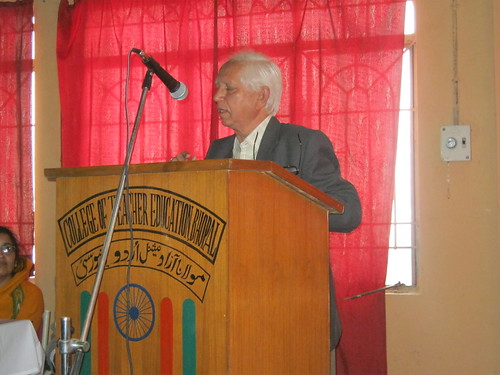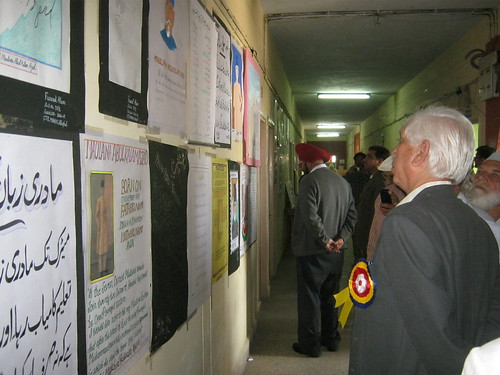By Pervez Bari, TwoCircles.net,
Bhopal: If the invaluable traits ingrained in Moulana Abul Kalam Azad are imbibed and replicated in this era by the young generation, on whose shoulders would lie the reins of the country, then the problems afflicting the countrymen could be solved to a great extent, said Prof Haider Abbas Rizvi, ex-Head of the Urdu Department in local Saifia College. He was delivering the presidential address in a seminar on “the Relevance of Maulana Abul Kalam Azad’s Thoughts & Contributions in Modern Times”. The seminar was organized on Monday under the aegis of the College of Teacher Education, Bhopal which is affiliated to the Maulana Azad National Urdu University, (MANUU), Hyderabad.
Prof Rizwi said that the towering personality of Maulana Abul Kalam Azad, the first Education Minister of Independent India, was laced with head and heart qualities of a thinker, philosopher, writer, educationist, preacher, freedom fighter, patriot and visionary etc. Maulana Azad passed away 52 years ago leaving behind an indelible impression of his vision and clarity of thoughts on the minds and hearts of the people in his era which if revived today can do wonders for the crisis-stricken society and help in building an exemplary Indian nation.

Prof. Haider Abbas Rizvi delivering presidential address in the seminar on Maulana Abul Kalam Azad
The first session of the seminar was presided over by Prof. Rizvi while the second session was presided over by another Urdu litterateur Mr. Naseem Ansari of MHK Institute, Bhopal. Mr. O. F. Khattani, president of Madhya Pradesh State Officers Association, delivered the inaugural address. An exhibition on the life and works of Maulana Azad with some rare photographs and sketches of his portrait were put up by the students of the B. Ed. College on the occasion. Principal of the college Prof. Mahmood Siddiqui while welcoming the guests threw light on the objectives of the seminar. The proceedings of the seminar were conducted by Dr. Sajid Jamal.
Mr. Naseem Ansari lauded Maulana Azad’s intellect and visionary thinking and said that the great freedom fighter was dead against the bifurcation of India to form Pakistan. To avert the division of the country the Maulana tried his level best but on one hand the Muslim League was hell bent for the partition, while on the other a large group in the Congress party was also in its favour. Countries do not come into existence on the basis of religion, as Pakistan which was formed in the name of Islam could not hold together and later split into two in the name of language. Religion could not stop the birth of Bangladesh, he remarked. However, Mr. Ansari opined that, the formation of Pakistan could not come up to the expectations of the Indian Muslims as those who migrated from India are still called “Mohajirs” (refugees) and continue to face many problems there.
The papers presented in the seminar included: “Tahreek Azadi Mein Maulana Azad Ka Kirdar” by Mr. Khalid Abidi; “Maulana Abul Kalam Azad’s Role in the Reform of Education” by Prof. J. S. Grewal; “Maulana Azad Ka Sciency Mizaj” by Dr. Mohammad Ahsan; “Maulana Azad Ki Adabi Khidmat” by Ms Nusrat Mehdi; “Maulana Azad Ki Shaksiyat Ke Roshan Pahlu” by Prof. Tahira Abbasi; “Maulana Azad Bataur Sahafi” by Arif Aziz; “Maulana Abul Kalam Azad and National Education System” by Ms Sheeba Hasan and “Taleemi Daere: Maulana Azad Ka Tasavvur-e-Ilm” by Dr. Talmeez Fatima Naqvi.

Prof. J.S. Grewal, Prof. Haider Abbas Rizvi along with Principal of the College Prof. Mahmood Siddiqui and others going round the exhibition on Maulana Abul Kalam Azad.
Prof. J. S. Grewal in his paper entitled “Maulana Abul Kalam Azad’s Role in the Reform of Education” portrayed the great educationist in the Moulana. He said that Moulana Azad’s standing as an outstanding scholar of Oriental learning was demonstrated in moulding the educational system of the country in the immediate post-independence years. As the Minister for Education he insisted that both the Union and the States must share responsibility in the promotion of education. He appointed the University Education Commission (UEC) in 1948 and the Secondary Education Commission (SEC) in 1952. Between 1947 and 1958, on his initiative the budgetary allocation for education was raised fifteen fold, he pointed out. Maulana Azad gave expression to his educational philosophy and interpretation of the issues of late 1940s and 1950s through his address delivered to the Central Advisory Board of Education (CABE), where reports of University and Secondary Education Commissions were discussed. These Commissions resulted in the establishment of the University Grants Commission (UGC), and the All India Council for Secondary Education. Maulana Azad brought about reform in higher education through the UGC which he established in December 1953. The UGC was perceived to be an agency through which all the reforms could be carried out. He appointed a Committee of Vice Chancellors to process the recommendation of University Education Commission.
Dr. Mohammad Ahsan, Regional Director of MANUU, Bhopal Centre, while presenting his paper titled “Maulana Azad Ka Sciency Mizaj” said that when Maulana Azad, on the insistence of Mahatma Gandhi and Pandit Nehru, took over the responsibilities of the Union Education Ministry the countrymen were taken by surprise as this freedom fighter, cleric, linguistic, litterateur and journalist also had the scientific temperament. Immediately after taking over the charge of the Union Education Ministry, he paid special attention to technical education and included basic education along with science education into the National Education System of the country. Many projects were taken up during his tenure as Union Education Minister from 1947-58 such as the opening of National laboratories, National Archives, national libraries and the Department of Archaeology etc. He assisted Pandit Nehru in setting up the Indian Council of Scientific and Industrial Research (CSIR) and many a chain of Science Laboratories in India, he added.
Dr. Mohammad Saheel Khan, the organizing secretary, took the leading role in organizing the seminar in collaboration with other members of the teaching and non-teaching staff of the college.

